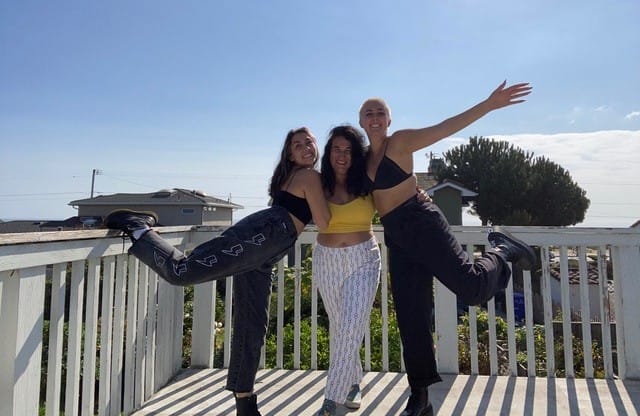
Here’s what I’ve learned about parenting a strong, independent young person while transitioning the job of food allergy management. It’s been challenging, illuminating – and most rewarding.
Parenting, as we all know, is a constant battle for sleep, time and energy. Then food allergies enter the picture. Instead of just worrying about the choices your child makes, you get the divine privilege of changing every external factor possible to make a safe little bubble where there are no allergens, and surfaces are clean, contaminants cannot be crossed, and rescue medications always within reach.
That bubble is safety, it is routine, and it is imperative that we teach our children that they can screw wheels onto that bubble and have it around them always. The hard part is realizing that we will not always be a part of that bubble. It means that we must help our children – many of whom are now young adults – to pack suitcases to the brim with all the medicines and life skills that we have.
My daughter Bela, 21, has a life-threatening peanut allergy, first discovered through an anaphylactic reaction at the age of 5. Bela (who uses they/them pronouns) also has asthma. This puts them into a higher risk category for anaphylaxis and drove home the critical need to prepare Bela to manage both these serious conditions.
As a parent, it has been an eyeopening ride, from teaching a child to speak up about the food allergy from a young age, and training Bela on medications and when to use. Then by the late teens, perhaps the most challenging of all: learning to let go. Ultimately, Bela has to manage and own this disease but, more than a few times in the process, I’ve had to bite my tongue.
Forging Trust in the Teens

When Bela was younger, the food allergy meant we cooked and packed almost all of our own meals. I made it fun, I found cool bento boxes and unique ways to allow her to experience her allergies in a way that made her excited to be differently abled. Of course, that was not without significant time invested in reading food labels, searching for safe restaurants and cooking a ton.
Once Bela turned 16, there was an entirely new level of trust we needed to forge together. Especially so, since athletics, dating and field trips increased. I would ask whether Bela had informed the coach about the allergy. It became their job to do so. The normal parent-teacher meetings then afforded me the opportunity to provide my mobile phone number, and I would offer a demo with my auto-injector trainer. The coaches all welcomed this. Since they’re motivated to see their athlete perform well, this made it easy.
As a parent, I was lucky enough to find an amazing food allergy support group. All these parents would share vendors, suppliers and experiences that would allow our children to have more food freedom and sense of normalcy. When it came to learning, I found this group very welcoming and helpful. We were always sharing allergists’ tips, and findings on new research and clinical trials. All of which provided a great launchpad, as we were living in a small town, and struggling to get the best care possible for our children.
Bela Led the College Search
When the time arrived to select colleges for enrollment in the fall of 2019, I made sure Bela took the lead, while I offered suggestions. I did stress that they had to be within 30 miles of a hospital. Bela was offered lacrosse scholarships at a couple schools where this was not the case, so unfortunately could not attend. I would encourage researching with the office of disabilities, and finding out all the allergy information available from the food services and cafeteria system. Bela would then dive in and report back to me about cool food services that different colleges would have, along with their art and technology programs.
Bela, who now attends Mills College in California, loves to learn. In fact, we learned a lot together. I was fortunate to be able to attend college tours, and I would always nudge Bela to ask about food services during these. Let it be known that I often got the stink eye, and the “I know” or “mother, please!” comments.
Providing ‘Agency’ to a Young Person
But I just needed to pull back and watch, and allow Bela to query the university staff in their own way. Bela, of course, knew that if the questions were not asked, I would be raising my hand and asking them. That would 100 percent worse, right? So, allowing our children to advocate for themselves, in their own style and their own way, is providing them with agency. It gives them the opportunity for self-advocacy and food allergy management.
It has been complex to transition all the health-care questions to my young adult, but with medical apps like MyChart and some texting tools, this is easier than before. My advice for transitioning is to pick your spots. Encourage them – when they are not having midterms or incredible amounts of stress – to learn to take on their own appointment scheduling, tracking exam dates, keeping medical files, managing prescriptions, etc.
It is a negotiation and process. But if you can demonstrate how you want them to take on ownership, since they will manage it more effectively, they will likely step up. Because really: what 21-year-old wants their mother at their annual allergist’s visit?
Lauren’s Top 10 Food Allergy Transition Tips
- Always listen to your gut as a parent. If you are concerned, then assert and ask clarifying questions of schools, vendors and/or service providers.
- Find a good online support group. Make sure you give as much as you receive.
- At school, be inviting with fellow parents, students and/or faculty.
- Save those epinephrine auto-injector trainers. They are especially useful tools for knowledge transfer to other young adults, who are curious about how they work.
- Advocate, chaperone, and read all the communications for risk mitigation.
- Ask your student key food allergy questions, to increase your confidence in their self-advocacy skills and food allergy management.
- If there is a reaction, once the danger has passed, make time to review the factors that caused it. This way, everyone involved can learn.
- Invite your student to speak at events and get involved with leadership with regards to food allergy management.
- Create ways for your student to become a role model for younger kids with food allergies. It is growth for both – and a powerful way to increase their agency and self-advocacy.
- Ask them to research colleges for the office of disabilities programs and/or food services programs. Then review and also ask other questions unrelated to allergies. This helps you to understand where they are at in the food allergy management and life skills transition.
Food allergy mom Lauren Klein is a business leadership strategist based in Reno, Nevada. She is the CEO of GirlMade, an organization that helps girls and women to develop entrepreneurial and networking skills. Learn more at: Girlmade.co.
Related Reading:
Calm, Cool and Ready to Epi in a Food Allergy Reaction
From Dorms to Dining Halls, the Good and the Bad of the College Experience with Food Allergies





